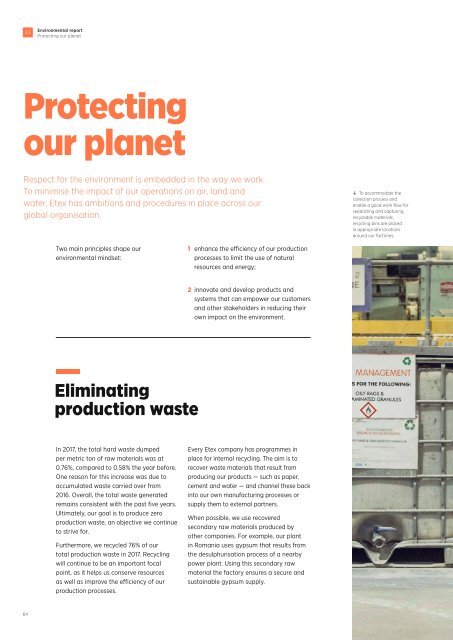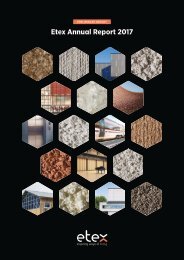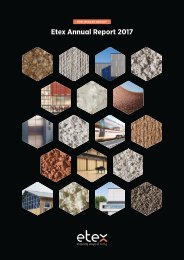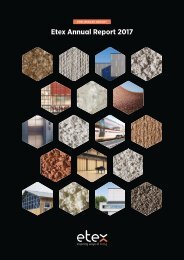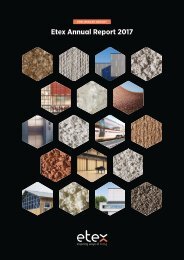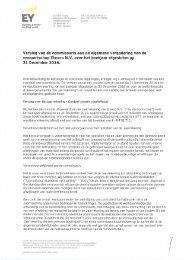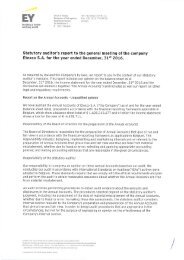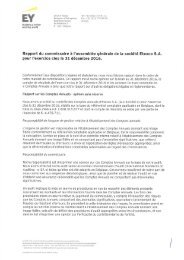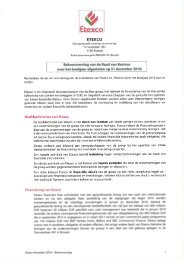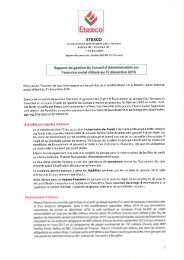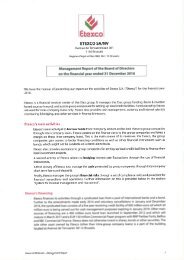Etex-AR2017-WEBSITE
You also want an ePaper? Increase the reach of your titles
YUMPU automatically turns print PDFs into web optimized ePapers that Google loves.
3.1<br />
Environmental report<br />
Protecting our planet<br />
<strong>Etex</strong> Annual Report 2017<br />
Environmental report<br />
Protecting our planet<br />
Protecting<br />
our planet<br />
Efficient use<br />
of water<br />
Dumped production waste<br />
per metric tonne<br />
of raw materials<br />
2013 0.76%<br />
2014<br />
0.76%<br />
Respect for the environment is embedded in the way we work.<br />
To minimise the impact of our operations on air, land and<br />
water, <strong>Etex</strong> has ambitions and procedures in place across our<br />
global organisation.<br />
Two main principles shape our<br />
environmental mindset:<br />
1 enhance the efficiency of our production<br />
processes to limit the use of natural<br />
resources and energy;<br />
2 innovate and develop products and<br />
systems that can empower our customers<br />
and other stakeholders in reducing their<br />
own impact on the environment.<br />
qqTo accommodate the<br />
collection process and<br />
enable a good work flow for<br />
separating and capturing<br />
recyclable materials,<br />
recycling bins are placed<br />
in appropriate locations<br />
around our factories.<br />
Water is a precious resource, and we aim<br />
to minimise our water use. The amount of<br />
water we need is different for every <strong>Etex</strong><br />
factory and can vary greatly depending on<br />
the type of production activity.<br />
Plants across <strong>Etex</strong> have programmes to<br />
enhance water reuse and use alternatives<br />
to drinking water. Installing monitoring<br />
systems, such as flow regulators also helps<br />
to reduce the overall use of water.<br />
In 2017, <strong>Etex</strong>’s water consumption totalled<br />
6,463,696 m 3 . This represents a 2.0% drop<br />
compared to 6,476,963 m 3 in 2016. Our use<br />
of drinking water also decreased, going<br />
from a 28% share in 2016 to 24% in 2017. We<br />
continue our aim to eliminate drinking water<br />
from our manufacturing processes altogether.<br />
2015<br />
2016<br />
2017<br />
Water consumption<br />
per source<br />
0.51%<br />
0.58%<br />
0.76%<br />
Borehole 32.7%<br />
Drinking<br />
Other<br />
23.7%<br />
43.6%<br />
Eliminating<br />
production waste<br />
% of drinking water in relation<br />
to total water consumption<br />
2013 23<br />
2014<br />
20<br />
2015<br />
22<br />
In 2017, the total hard waste dumped<br />
per metric ton of raw materials was at<br />
0.76%, compared to 0.58% the year before.<br />
One reason for this increase was due to<br />
accumulated waste carried over from<br />
2016. Overall, the total waste generated<br />
remains consistent with the past five years.<br />
Ultimately, our goal is to produce zero<br />
production waste, an objective we continue<br />
to strive for.<br />
Furthermore, we recycled 76% of our<br />
total production waste in 2017. Recycling<br />
will continue to be an important focal<br />
point, as it helps us conserve resources<br />
as well as improve the efficiency of our<br />
production processes.<br />
Every <strong>Etex</strong> company has programmes in<br />
place for internal recycling. The aim is to<br />
recover waste materials that result from<br />
producing our products — such as paper,<br />
cement and water — and channel these back<br />
into our own manufacturing processes or<br />
supply them to external partners.<br />
When possible, we use recovered<br />
secondary raw materials produced by<br />
other companies. For example, our plant<br />
in Romania uses gypsum that results from<br />
the desulphurisation process of a nearby<br />
power plant. Using this secondary raw<br />
material the factory ensures a secure and<br />
sustainable gypsum supply.<br />
2016<br />
28<br />
2017<br />
24<br />
Total water consumption (m3)<br />
2013 6,863,472<br />
2014<br />
6,895,128<br />
2015<br />
6,798,029<br />
2016<br />
6,476,963<br />
2017<br />
6,463,696<br />
64 65


